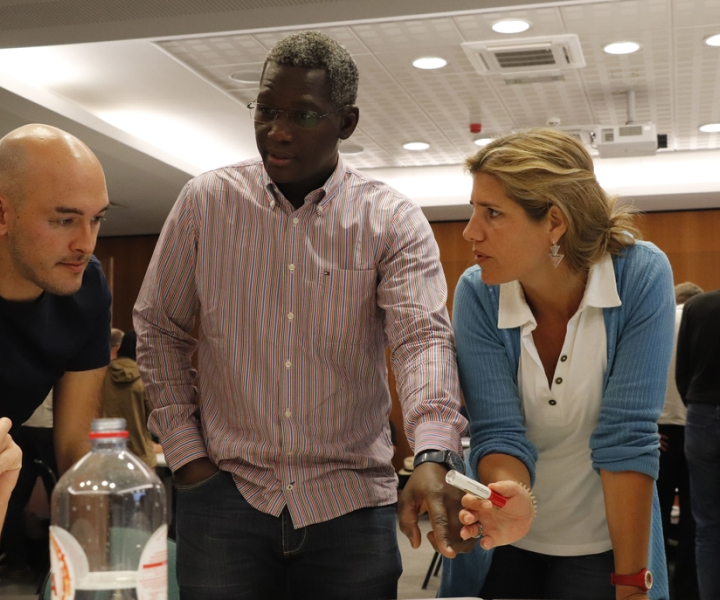Work with MSF internationally
Act close to vulnerable populations with our multicultural and multidisciplinary teams by working abroad within or in proximity to our projects.
Take action at the heart of our interventions
Going abroad for several months as an International Mobile Staff working on MSF projects, regardless of the context, requires a high level of motivation, flexibility and the ability to live and work with multidisciplinary and multicultural local and international teams.
This unique professional and human experience is also demanding because of the long working hours, the often remote or unstable contexts, the living conditions, the limited resources, and other factors.
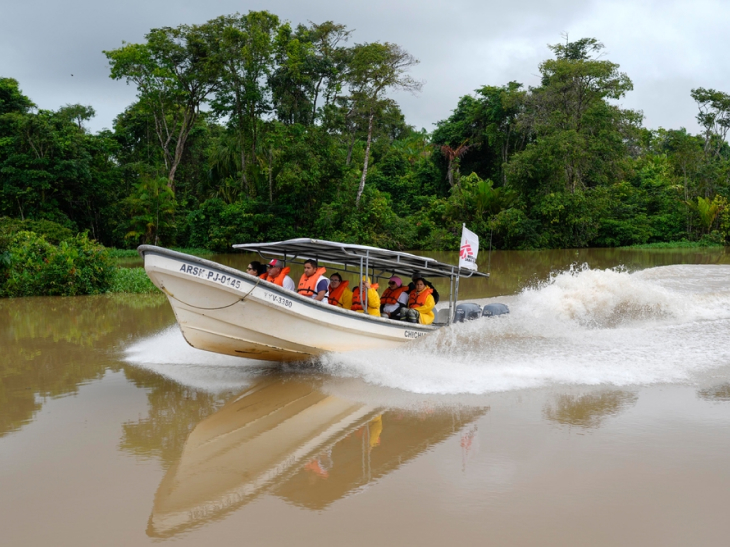
Our international staff profiles
We continuously recruit more than 30 profiles with a wide variety of medical, paramedical and non-medical expertise to work on our many projects around the world. Our international staff come from diverse backgrounds and join us at different stages of their careers
Medical Profiles
Medical doctors and specialists in emergency, prevention and infection, pediatrics, gynaecology, anaesthesia, surgery, psychiatry, etc.
Paramedical profiles
Nurses, midwives (or male midwives), psychologists, health promoters, pharmacy, microbiology or laboratory specialists, water and sanitation specialists, epidemiologists, etc.
Non-Medical profiles
Specialists in human resources and/or finance, logistics, construction, energy, supply, communications, legal expertise, etc.
How to apply ?
Apply to the nearest MSF office. We have many offices around the world that recruit and accompany our international staff throughout their careers
Who is eligible to apply for an international mobile profile on this site ?
- Staff employed locally by MSF Belgium in our projects or offices, regardless of their country of residence
- Individuals whose official residence is in the following list
Discover the many international profiles we are recruiting and apply at any time from the page of the profile you match
Our basic eligibility requirements
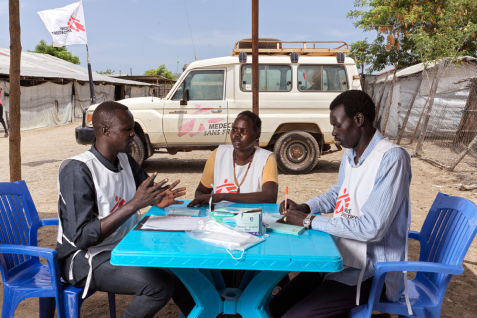
- Demonstrate strong humanitarian motivation and adhere to MSF's core values, principles and ethical behaviours
-
Working with MSF demonstrates a commitment to vulnerable populations that goes far beyond a simple job. Neutrality, impartiality, non-discrimination, personal commitment, medical ethics, respect for human dignity, responsible behaviour and transparency are MSF's key values. As lived and put into practice on a daily basis, they represent a veritable lifestyle through the choices made by the organisation as a whole and by each of its members individually.
- Commitment to multiple assignments of 6 to 12 months for a minimum period of 2 years.
-
We are looking for people who are willing to commit to several assignments of 6 to 12 months in different contexts and whose ambition is to develop their skills and grow within the organisation. Our international employees are mobile and take on several assignments in different contexts. Recruiting and training an employee represents a significant investment of time and material resources for MSF.
- Willingness to work anywhere, including in politically unstable contexts and conflict zones
-
Even if you are traveling to a country for an intervention with MSF for the first time, it is crucial to scrupulously follow the strict safety rules established by MSF.
- Able to relocate without family or partner
-
Due to the demanding nature of our work and the contexts in which we have to operate, we ask our staff to leave on our projects without a partner and/or family.
- At least two years of professional experience relevant to your profile
-
With a few exceptions, a sufficient level of practical skills, expertise and autonomy is essential to enhance your credibility with local contacts. Unpaid internships are not recognised as professional experience. As you will almost always be starting out in a managerial role supervising national and/or international teams, some experience of management, coordination of local and/or international teams and coaching is desirable. Experience in a multicultural, associative or humanitarian environment is also an advantage.
- Demonstrate key transversal skills
-
When you go on a work assignment, you leave your everyday environment behind. It's crucial to have an open mind to accept and integrate this reality. You work in synergy with your colleagues, supporting each other. The main transversal skills required are: team spirit, flexibility, open-mindedness, adaptability, quality and results orientation, organisation and planning, stress management, etc.
- Have a good knowledge and fluency in English and French
-
As the primary languages used in our projects, proficiency in them is essential not only to deploy you where needed but also to provide you with greater opportunities for assignments and development. Additionally, proficiency in other languages frequently used in our assignments, such as Arabic, Spanish, Portuguese, etc., can make a significant difference.
- A state of health that is compatible with the reality of our activities and the contexts in which we operate, and that is in order with regard to vaccinations.
-
Before beginning your assignment, you will need to ensure that the following vaccinations are up to date: Yellow Fever, Tetanus-Diphtheria-Pertussis, Measles, Hepatitis A & B, Polio, Rabies, ACWY Meningitis, Typhoid Fever, and COVID-19. Additional vaccinations may be required depending on the country of assignment, along with preventive measures against diseases such as malaria. If you have a chronic illness that allows you to continue working and traveling, you may still be eligible to participate in our projects. However, your deployment is subject to assessment by our Staff Health Unit to ensure compatibility with our operating environments. We ensure that your medical condition is stable and that your workplace offers adequate monitoring and high-quality care, including rapid evacuation in crisis situations
Make an informed decision before committing to MSF
Thousands of international employees have found their experience with MSF both rewarding and challenging. For many, it has been a turning point in their lives.
We all agree on the importance of taking the time to question, inform and prepare ourselves before applying and making a commitment.
- Your motivation ?
-
The decision to go and work for a humanitarian organization in contexts that are often not very stable is not something you can do on the spur of the moment! Enthusiasm, a desire to help or to travel are not enough. Beyond the application of your professional skills, your application demonstrates a commitment to vulnerable populations, with understanding, adherence and respect for MSF's mission and principles. What do you think of MSF's mission to bear witness to the issues that people face, or of its position on access to medicines or safe abortion? Before applying, ask yourself why you want to join and contribute to MSF, and what you expect from it.
What are your reasons for wanting to work at the heart of MSF's interventions ?
Do your motivations and values match MSF's purpose/mandate ?
Have you idealized our work or are you making an informed choice ? - Your open-mindedness towards other cultures ?
-
While working internationally, you'll be confronted with social and cultural realities that often differ from your socio-cultural background. For example, punctuality at work, hierarchical relationships and relations between men and women may differ from one country, region or ethnic group to another. Certain beliefs, practices or behaviors will no doubt strike you as strange, retrograde, unfair or simply unusual. Knowing your own cultural biases and being tolerant of the populations you meet, as well as local and international employees who think and act differently from you, is essential. This is one of MSF's core values.
What is your experience with other cultures or ways of operating, communicating, etc. ?
How do you adapt to cultural differences?
How do you react to what you see as injustice? - Working and living conditions in the countries of our interventions?
-
Living conditions vary extremely from one project to another, from a tent in the middle of the bush to accommodation in the middle of the city. Sometimes very basic, they often deprive you of your usual comforts. Weather conditions and frequent power cuts, to which you may not be familiar, can make daily life a challenge. Having access to electricity or internet only at certain times of the day, spending evenings lit by candlelight, taking showers with buckets of cold water, working in temperatures of over 40 degrees or in mud or snow, coming across snakes or scorpions, etc. - let's face it: it's not easy for everyone to put up with these conditions for several months.
How do you cope with living conditions that are different from what you're used to ?
What elements of your usual comfort would you find hard to miss ? - Your security ?
-
Each individual is responsible for their own safety and that of their team. All your actions, as an MSF employee, can have a direct impact not only on the people with whom you interact, but also on the activities in progress and therefore on the population we are helping. Working in MSF projects means representing MSF day and night, 7 days a week, even during your free time and holidays. MSF takes the safety of its staff very seriously. We inform you of the security measures to be followed (curfews, various restrictions) which may limit your movements and your interactions with the local population during and outside working hours. In all cases, you must respect them scrupulously, otherwise you risk endangering yourself or the rest of the team. Have you ever felt unsafe?
What restrictions on freedom of movement are you prepared to accept ?
What safety rules have you already had to follow, and how did you feel about it ? - Stress and health concerns ?
-
Life in the humanitarian aid projects can be difficult and the pace of work can be intense. Working with MSF can generate stress due to the context, the complete change of environment or the different living conditions. A heavy workload, the distance from your family and friends, possible health problems, tensions between colleagues, feelings of insecurity, confrontations with the reality and distress of the population, and sometimes difficult relations with the local authorities are all challenges to which you must show resilience and tenacity. MSF puts in place preventive measures and/or medical or psychological care when its employees are confronted with complex situations during and after their assignment.
What are your sources of stress and how do you manage stress in your daily life?
How do you manage stress in a team ?
How do you deal with your personal problems so that you can get through the required assignment ? - The impact on your family and private life ?
-
Working abroad for several months away from your family and friends can be difficult, despite the means of communication available. Those around you may not always understand your reality and your daily challenges, and may feel a little powerless to give you moral support from a distance. Going on an assignment abroad is certainly exciting, but coming back can be hard on you and your family: working for MSF leaves its mark.
What do the people around you think of your wish to go on a humanitarian mission with MSF ?
Can you imagine the challenges you might face being away from your family ?
How will you prepare and manage your return ?
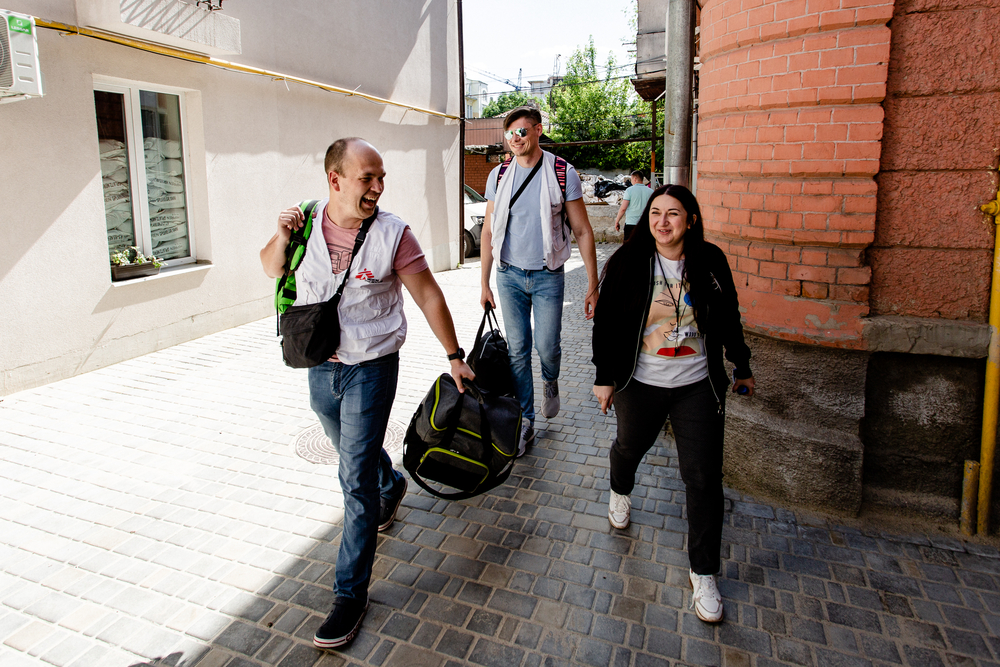
Infosessions
Participate in one of our information sessions to find out if working internationally with MSF matches your career goals.
After a brief presentation of our organisation and our working environment, discover the stories of some of our international employees. We also present the profiles we are looking for and the application process to become an international mobile staff member.
consult our digital version
WHAT MSF OFFERS ?
Per assignment as an international employee in our projects :
- A fixed-term international employee contract depending on the duration of the assignment
- A monthly salary based on MSF's salary grid;
- A monthly living expenses allowance in local currency allocated in the country of intervention (per diem);
- An insurance policy that covers the employee's health care, repatriation and accidents
- Payment of transport costs to and from your place of residence to your place of assignment
- Collective accommodation, often modest depending on the area of intervention
- Dedicated day-off periods depending on the length of the assignment
But above all, a meaningful humanitarian commitment and a humane, stimulating work environment.
Prepare your application
- Find out more about the MSF movement and related principles, as well as the areas of expertise and action of MSF
- Have a look at MSF news and the many testimonials from our employees
- Consider your motivation for joining MSF
- Identify the position you think would correspond with your profile and why
- Discover our recruitment principles and application procedure
- Explore our Frequently Asked Questions
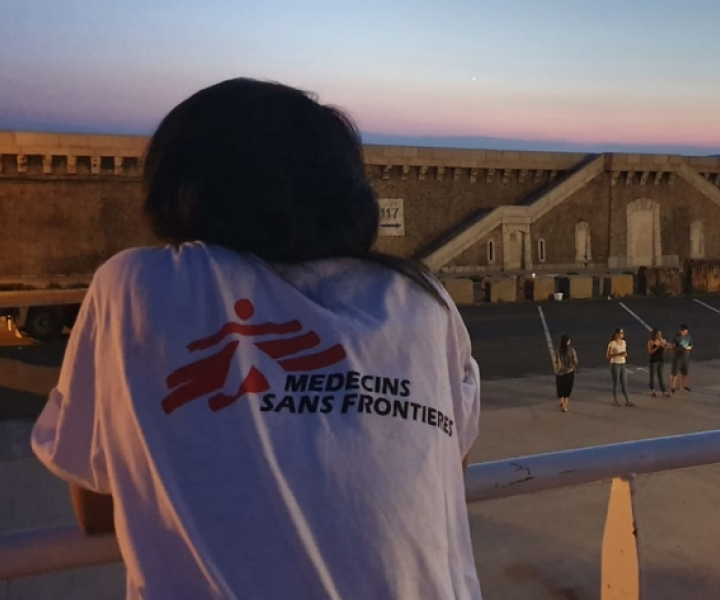
Other opportunities to work abroad with MSF
When a specific specialist profile is needed with a pre-determined length of assignment in one of our particular projects, we advertise that opportunity to recruit specifically for that immediate position.
We also frequently have opportunities to provide support and expertise to our activities from our regional offices closer to our projects around the world.
Many of our support and expertise functions based in our Brussels offices or around the world require multiple trips to our projects, sometimes up to 70% for mobile implementation officer positions.
Work with MSF in Belgium
Your experiences, your current qualifications, your personal situation or your willingness to leave in any context will prevent you from working with MSF internationally?
Find out more about the numerous opportunities to work for or support MSF in Belgium.
